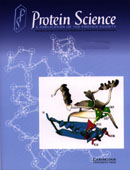Crossref Citations
This article has been cited by the following publications. This list is generated based on data provided by
Crossref.
Benham, A. M.
and
Braakman, I.
2000.
Glycoprotein Folding in the Endoplasmic Reticulum.
Critical Reviews in Biochemistry and Molecular Biology,
Vol. 35,
Issue. 6,
p.
433.
Woycechowsky, Kenneth J
and
Raines, Ronald T
2000.
Native disulfide bond formation in proteins.
Current Opinion in Chemical Biology,
Vol. 4,
Issue. 5,
p.
533.
Webb, Helen M.
Ruddock, Lloyd W.
Marchant, Rosalyn J.
Jonas, Kim
and
Klappa, Peter
2001.
Interaction of the Periplasmic Peptidylprolylcis-trans Isomerase SurA with Model Peptides.
Journal of Biological Chemistry,
Vol. 276,
Issue. 49,
p.
45622.
Freedman, Robert B.
Klappa, Peter
and
Ruddock, Lloyd W.
2002.
Protein disulfide isomerases exploit synergy between catalytic and specific binding domains.
EMBO reports,
Vol. 3,
Issue. 2,
p.
136.
Freedman, Robert B.
Klappa, Peter
and
Ruddock, Lloyd W.
2002.
Protein Sensors and Reactive Oxygen Species - Part B: Thiol Enzymes and Proteins.
Vol. 348,
Issue. ,
p.
342.
Alanen, H. I.
Salo, K. E. H.
Pekkala, M.
Siekkinen, H. M.
Pirneskoski, A.
and
Ruddock, L. W.
2003.
Defining the Domain Boundaries of the Human Protein Disulfide Isomerases.
Antioxidants & Redox Signaling,
Vol. 5,
Issue. 4,
p.
367.
Russell, Sarah J.
Ruddock, Lloyd W.
Salo, Kirsi E.H.
Oliver, Jason D.
Roebuck, Quentin P.
Llewellyn, David H.
Roderick, H. Llewelyn
Koivunen, Peppi
Myllyharju, Johanna
and
High, Stephen
2004.
The Primary Substrate Binding Site in the b′ Domain of ERp57 Is Adapted for Endoplasmic Reticulum Lectin Association.
Journal of Biological Chemistry,
Vol. 279,
Issue. 18,
p.
18861.
Barnewitz, Kathrin
Guo, Chaoshe
Sevvana, Madhumati
Ma, Qingjun
Sheldrick, George M.
Söling, Hans-Dieter
and
Ferrari, David M.
2004.
Mapping of a Substrate Binding Site in the Protein Disulfide Isomerase-related Chaperone Wind Based on Protein Function and Crystal Structure.
Journal of Biological Chemistry,
Vol. 279,
Issue. 38,
p.
39829.
Pirneskoski, Annamari
Klappa, Peter
Lobell, Mario
Williamson, Richard A.
Byrne, Lee
Alanen, Heli I.
Salo, Kirsi E.H.
Kivirikko, Kari I.
Freedman, Robert B.
and
Ruddock, Lloyd W.
2004.
Molecular Characterization of the Principal Substrate Binding Site of the Ubiquitous Folding Catalyst Protein Disulfide Isomerase.
Journal of Biological Chemistry,
Vol. 279,
Issue. 11,
p.
10374.
Ellgaard, Lars
and
Ruddock, Lloyd W.
2005.
The human protein disulphide isomerase family: substrate interactions and functional properties.
EMBO reports,
Vol. 6,
Issue. 1,
p.
28.
Collén, Anna
Saloheimo, Markku
Bailey, Michael
Penttilä, Merja
and
Pakula, Tiina M.
2005.
Protein production and induction of the unfolded protein response inTrichoderma reeseistrain Rut-C30 and its transformant expressing endoglucanase I with a hydrophobic tag.
Biotechnology and Bioengineering,
Vol. 89,
Issue. 3,
p.
335.
Zhao, Tong-Jin
Ou, Wen-Bin
Xie, Qiang
Liu, Yang
Yan, Yong-Bin
and
Zhou, Hai-Meng
2005.
Catalysis of Creatine Kinase Refolding by Protein Disulfide Isomerase Involves Disulfide Cross-link and Dimer to Tetramer Switch.
Journal of Biological Chemistry,
Vol. 280,
Issue. 14,
p.
13470.
Alanen, H.I.
Salo, K.E.H.
Pirneskoski, A.
and
Ruddock, L.W.
2006.
pH Dependence of the Peptide Thiol-Disulfide Oxidase Activity of Six Members of the Human Protein Disulfide Isomerase Family.
Antioxidants & Redox Signaling,
Vol. 8,
Issue. 3-4,
p.
283.
Alanen, Heli I.
Williamson, Richard A.
Howard, Mark J.
Hatahet, Feras S.
Salo, Kirsi E.H.
Kauppila, Annika
Kellokumpu, Sakari
and
Ruddock, Lloyd W.
2006.
ERp27, a New Non-catalytic Endoplasmic Reticulum-located Human Protein Disulfide Isomerase Family Member, Interacts with ERp57.
Journal of Biological Chemistry,
Vol. 281,
Issue. 44,
p.
33727.
Maattanen, P.
Kozlov, G.
Gehring, K.
and
Thomas, D.Y.
2006.
ERp57 and PDI: multifunctional protein disulfide isomerases with similar domain architectures but differing substrate–partner associationsThis paper is one of a selection of papers published in this Special Issue, entitled CSBMCB — Membrane Proteins in Health and Disease..
Biochemistry and Cell Biology,
Vol. 84,
Issue. 6,
p.
881.
Karala, Anna-Riikka
Psarrakos, Panagiotis
Ruddock, Lloyd W.
and
Klappa, Peter
2007.
Protein Disulfide Isomerases fromC. elegansare Equally Efficient at Thiol-Disulfide Exchange in Simple Peptide-Based Systems But Show Differences in Reactivity Towards Protein Substrates.
Antioxidants & Redox Signaling,
Vol. 9,
Issue. 11,
p.
1815.
Hatahet, Feras
and
Ruddock, Lloyd W.
2007.
Substrate recognition by the protein disulfide isomerases.
The FEBS Journal,
Vol. 274,
Issue. 20,
p.
5223.
van Lith, Marcel
Karala, Anna-Riikka
Bown, Dave
Gatehouse, John A.
Ruddock, Lloyd W.
Saunders, Philippa T.K.
Benham, Adam M.
and
Munro, Sean
2007.
A Developmentally Regulated Chaperone Complex for the Endoplasmic Reticulum of Male Haploid Germ Cells.
Molecular Biology of the Cell,
Vol. 18,
Issue. 8,
p.
2795.
Chakravarthi, Seema
Jessop, Catherine E.
and
Bulleid, Neil J.
2008.
Oxidative Folding of Peptides and Proteins.
p.
81.
Hatahet, Feras
and
Ruddock, Lloyd W.
2009.
Protein Disulfide Isomerase: A Critical Evaluation of Its Function in Disulfide Bond Formation.
Antioxidants & Redox Signaling,
Vol. 11,
Issue. 11,
p.
2807.


